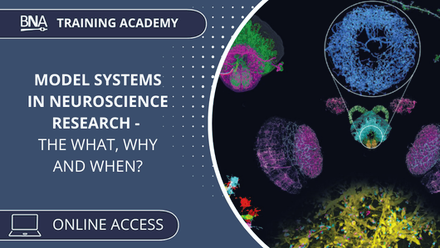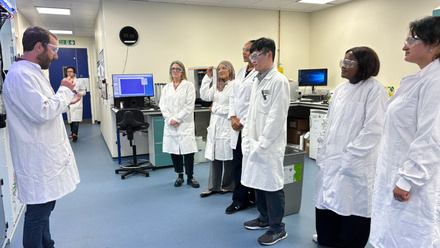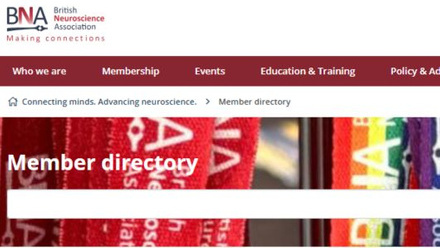BNA Learning Outcomes Approved by Royal Society of Biology
We are excited to announce that the British Neuroscience Association (BNA)’s proposed neuroscience-specific learning outcomes have been officially approved by the Royal Society of Biology (RSB). These outcomes have now been incorporated into the latest RSB Accreditation Handbook, marking a major milestone in setting clear educational standards for neuroscience degree programmes across the UK.
Why Is This Important?
Currently, there are no universal standards for undergraduate or postgraduate neuroscience courses, meaning the quality of courses can vary significantly. Future neuroscientists face challenges in identifying programmes that will provide them with the comprehensive training they need. As the UK’s leading professional organisation for neuroscience, the BNA has taken the initiative to address this issue by developing standards for neuroscience education.
The BNA Accreditation Working Group, led by Dr Sandrine Williame-Morawek (BNA Education & Engagement Secretary) and supported by BNA trustees and members, has worked closely with the RSB to integrate these learning outcomes into their well-established degree accreditation scheme. This collaboration ensures that BSc Neuroscience courses and Biomedical Science courses with neuroscience modules that pursue RSB accreditation will adhere to these agreed-upon educational standards.
What Are the BNA’s Learning Outcomes?
The BNA’s suggested learning outcomes outline the knowledge and skills that a graduate of a neuroscience programme should have.
Graduates are expected to:
- Explain core neuroscience topics such as neuroanatomy, neurochemistry, neural systems, affect, behaviour, and cognition.
- Apply advanced knowledge of neuroscience to analyse and interpret data from experimental, research, or clinical studies across multiple levels (molecular, cellular, systems, cognitive, behavioural).
- Explain the impact and translational value of neuroscience research, including its clinical, ethical, legal, and social implications.
- Describe contemporary neuroscience research and discuss emerging priorities and advancements in the field.
In addition to these core outcomes, the BNA provided supplementary guidance that complements the RSB’s existing accreditation criteria. These align closely to our values and includes an emphasis on credible research practices, career development, and promoting equality, diversity, and inclusion (EDI) in science.
A Community-Led Initiative
This achievement is a result of extensive collaboration with our BNA community. Through surveys and feedback, BNA members played a crucial role in shaping the final list of learning outcomes. The approval of these outcomes is a testament to the collective effort of educators, students, and professionals within our community. Together, we are helping ensure that future neuroscientists receive a comprehensive and well-rounded education, equipping them for successful careers in the field.
What’s Next?
Building on this success, the BNA has broadened its scope to support educational development across neuroscience programmes. The Accreditation Working Group has evolved into the Training and Accreditation Working Group, with plans to introduce BNA-led training initiatives by 2025. While the RSB accreditation provides a strong foundation, the BNA recognises that not all degrees relevant to neuroscience, such as psychology or cognitive neuroscience, will seek RSB accreditation. Therefore, we are exploring additional ways to support neuroscience education across the wider spectrum of courses.
We are excited about the opportunities ahead and look forward to working with institutions and educators to uphold the highest standards in neuroscience education. For more information on accreditation, visit the Royal Society of Biology’s Accreditation page. You can also find the RSB’s general accreditation criteria here, and the neuroscience learning outcomes in Appendix B, p. 61.
With thanks to the BNA Accreditation Working Group members, and members of the BNA community who contributed to the development of these Learning Outcomes:
Sandrine Willaime-Morawek, Emma Soopramanien, Tara Spires-Jones, Volko Straub, Michael Ashby, Daniel Fulton, Talitha Kerrigan, Georgia Boothe, Christopher Adams, Leanne McKay, Kamer Ameen-Ali, Amol Bhandare, Ryan Stanyard & Bethany Faucer.
What is accreditation?
Accreditation is acknowledgement by an external body that a programme meets a defined set of overarching criteria. Accreditation by the Royal Society of Biology (RSB) recognises and supports the advancement of skills and education in the biosciences, throughout the UK and internationally. Graduates from accredited programmes are equipped with well-rounded knowledge and skills, making them highly employable both within and beyond their chosen field.
Who are the Royal Society of Biology?
The Royal Society of Biology is a single unified voice for biology: advising Government and influencing policy; advancing education and professional development; supporting our members; and engaging and encouraging public interest in the life sciences. With more than 18,000 individual members and over 100 member organisations, the Society represents a significant and diverse membership including students, practising scientists, industry leaders, academics and interested non-professionals. For information about the Royal Society of Biology, see www.rsb.org.uk






